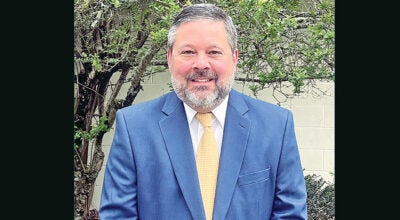Gen. Sherman marches into region
Published 10:36 pm Saturday, September 26, 2009
IRONTON — The “first modern general” marched his way into Lawrence County Friday but left with a smile instead of scorching the Earth.
Gen. William Tecumseh Sherman made a pair of appearances as part of the “History Alive” series at Ohio University Southern. He performed at the OUS Ironton campus in the afternoon and later in the day to kick off the Fourth Annual Furnace Festival at Lake Vesuvius.
Frank Bulloch, who ironically is from the same hometown as Sherman — Lancaster, Ohio — portrayed the 19th century military leader.
William Tecumseh Sherman was the U.S. Civil War general who famously said, “War is hell” while leading a destructive campaign through the south that burned the cities of Atlanta, Ga. and Columbia, S.C.
Bulloch has depicted Sherman for more than five years and calls himself a Civil War history “buff.” The Civil War and Sherman runs in Bulloch’s family, as his wife is the director of the Sherman House Museum in Lancaster.
Claiming to look more like Sherman’s younger brother John Sherman, who drafted the still-effective Sherman Antitrust Act, Bulloch said the re-enactments are a great way to teach the history of the Civil War.
“It’s fun for people who are serious abut history,” Bulloch said between performances while complimenting the students in attendance at the OUS morning performance. “I was very impressed with the students. They paid very close attention.”
Bulloch, now retired, does about 10 engagements a year throughout the state for a variety of organizations and seminars. His visit to Ironton on Friday was the furthest south he has brought the Sherman character.
Each presentation is broken up into two parts: A 40-to-45 minute presentation by Gen. Sherman describing his “March to the Sea” and a question and answer session.
Bulloch says most of the questions he receives range from Sherman’s relationship with President Abraham Lincoln, to why did he select the route he chose from Atlanta to the Carolinas, to Sherman’s thoughts on “Total War” and did Sherman ever think the South had a chance to win the Civil War.
“Sherman was a nervous individual,” Bulloch said when describing Sherman. “He was excellent at brainstorming ideas and that is what made him very effective.”
A graduate of the United States Military Academy at West Point in 1840, Sherman served without distinction during the Mexican War and, as a young lieutenant, was sent by President James Polk to report on California’s gold rush in 1847.
He left the military in 1853 and tried unsuccessfully to build a career in banking in California and law in Kansas before becoming superintendent of the Louisiana Military Seminary (the forerunner of Louisiana State University).
After the South seceded, Sherman returned to the Army in 1861 as a colonel and went on to participate in some of the Civil War’s biggest campaigns, including Bull Run, Shiloh, Vicksburg and Chattanooga.
In the spring of 1864, Sherman, who commanded the Union armies of the Cumberland, the Tennessee and the Ohio, began a spectacular drive against the armies of Gen. Joseph E. Johnson that ended with the Union occupation of Atlanta. Sherman ordered the city evacuated and razed which was part of his strategy to economically cripple and psychologically intimidate the rebels.
After the Atlanta campaign, Sherman began his “March to the Sea,” a property-destroying drive that began in November and ended with the occupation of Savannah on Dec. 21, 1864 (his “Christmas present” to President Abraham Lincoln).
Sherman then marched up through the Carolinas and received Johnson’s surrender in North Carolina on April 26, 1865, just after Robert E. Lee surrendered to Gen. Ulysses S. Grant at Appomattox on April 9, 1865.
Bulloch said one of the best quotes ever said about Sherman came from a subordinate who had the opportunity to see the General at his best.
“There is nothing more exciting than when Gen. Sherman enters the room and there is nothing more relaxing that when he leaves.”
Gen. William Tecumseh Sherman might have left us 118 years ago, but for Frank Bullock, remembering the man who was instrumental in shaping the country we have today, will never be forgotten.





